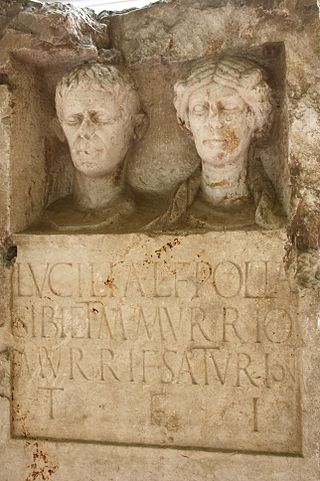Related Research Articles

The gens Valeria was a patrician family at ancient Rome, prominent from the very beginning of the Republic to the latest period of the Empire. Publius Valerius Poplicola was one of the consuls in 509 BC, the year that saw the overthrow of the Tarquins, and the members of his family were among the most celebrated statesmen and generals at the beginning of the Republic. Over the next ten centuries, few gentes produced as many distinguished men, and at every period the name of Valerius was constantly to be found in the lists of annual magistrates, and held in the highest honour. Several of the emperors claimed descent from the Valerii, whose name they bore as part of their official nomenclature.

The gens Atilia, sometimes written Atillia, was a plebeian family at ancient Rome, which rose to prominence at the beginning of the fourth century BC. The first member of this gens to attain the consulship was Marcus Atilius Regulus, in 335 BC. The Atilii continued to hold the highest offices of the state throughout the history of the Republic, and well into imperial times.

The gens Lucilia was a plebeian family at ancient Rome. The most famous member of this gens was the poet Gaius Lucilius, who flourished during the latter part of the second century BC. Although many Lucilii appear in Roman history, the only one known to have obtained any of the higher offices of the Roman state was Lucilius Longus, consul suffectus in AD 7.

The gens Cornelia was one of the greatest patrician houses at ancient Rome. For more than seven hundred years, from the early decades of the Republic to the third century AD, the Cornelii produced more eminent statesmen and generals than any other gens. At least seventy-five consuls under the Republic were members of this family, beginning with Servius Cornelius Maluginensis in 485 BC. Together with the Aemilii, Claudii, Fabii, Manlii, and Valerii, the Cornelii were almost certainly numbered among the gentes maiores, the most important and powerful families of Rome, who for centuries dominated the Republican magistracies. All of the major branches of the Cornelian gens were patrician, but there were also plebeian Cornelii, at least some of whom were descended from freedmen.

The gens Porcia, rarely written Portia, was a plebeian family at Ancient Rome. Its members first appear in history during the third century BC. The first of the gens to achieve the consulship was Marcus Porcius Cato in 195 BC, and from then until imperial times, the Porcii regularly occupied the highest offices of the Roman state.

The gens Antistia, sometimes written Antestia on coins, was a plebeian family at ancient Rome. The first of the gens to achieve prominence was Sextus Antistius, tribune of the plebs in 422 BC.

The gens Antonia was a Roman family of great antiquity, with both patrician and plebeian branches. The first of the gens to achieve prominence was Titus Antonius Merenda, one of the second group of Decemviri called, in 450 BC, to help draft what became the Law of the Twelve Tables. The most prominent member of the gens was Marcus Antonius.
The gens Arria was a plebeian family of ancient Rome, first recorded in the final century of the Republic, and prestigious during imperial times. The first of the gens to achieve prominence was Quintus Arrius, praetor in 72 BC.

The gens Memmia was a plebeian family at ancient Rome. The first member of the gens to achieve prominence was Gaius Memmius Gallus, praetor in 172 BC. From the period of the Jugurthine War to the age of Augustus they contributed numerous tribunes to the Republic.

The gens Maria was a plebeian family of Rome. Its most celebrated member was Gaius Marius, one of the greatest generals of antiquity, and seven times consul.

The gens Curtia was an ancient but minor noble family at Rome, with both patrician and plebeian branches. The only member of the gens invested with the consulship under the Republic was Gaius Curtius Philo, in 445 BC. A few Curtii held lesser magistracies during the Republic, and there were two consuls suffectus in imperial times. However, the gens is best remembered from a series of legends dating from the traditional founding of the city to the early Republic.
The gens Flaminia was a plebeian family at ancient Rome. During the first five centuries of Rome, no mention is made of any member of the Flaminia gens. In former times the Flaminii were believed to be only a family of the Quinctia gens; but this opinion arose from a confusion of the Flaminii with the Flaminini, the latter of whom belonged to the ancient patrician Quinctia gens.

The gens Fonteia was a plebeian family at ancient Rome. Members of this gens are first mentioned toward the end of the third century BC; Titus Fonteius was a legate of Publius Cornelius Scipio during the Second Punic War. The first of the Fonteii to obtain the consulship was Gaius Fonteius Capito, consul suffectus in 33 BC.
The gens Fulcinia was a minor plebeian family at ancient Rome. The first of this name to appear in history is Gaius Fulcinius, one of the ambassadors to Fidenae in 438 BC. After this, no Fulcinius is mentioned until the time of Cicero. Several Fulcinii are known from the first century BC, although it is not clear whether or how they were related to the ambassador.

The gens Juventia, occasionally written Jubentia, was an ancient plebeian family at Rome. After centuries of obscurity, the gens emerges into history with the appearance of Titus Juventius, a military tribune, in the beginning of the second century BC. The first of the Juventii to obtain the consulship was Marcus Juventius Thalna in 163 BC. But the family is renowned less for its statesmen than for its jurists, who flourished during the second century AD.
The gens Lucceia, occasionally Luceia or Luccia, was a plebeian family at Rome, which flourished during the final century of the Republic and under the early Empire.
The gens Maenia, occasionally written Mainia, was a plebeian family at ancient Rome. Members of this gens are first mentioned soon after the establishment of the Republic, and occur in history down to the second century BC. Several of them held the position of tribune of the plebs, from which they strenuously advocated on behalf of their order. The most illustrious of the family was Gaius Maenius, consul in 338 BC, and dictator in both 320 and 314. In some manuscripts, the nomen Maenius appears to have been erroneously substituted for Menenius or Manlius; there are also instances of confusion with Manilius, Maelius, and Maevius.

The gens Plancia was a minor plebeian family of equestrian rank at ancient Rome. Few members of this gens are mentioned in the time of the Republic, but a family of the Plancii rose to prominence from the time of Vespasian, and held a number of important magistracies through the time of Hadrian. Other Plancii are known from inscriptions.

The gens Procilia, sometimes written Procillia, was a minor plebeian family at ancient Rome. Members of this gens are first mentioned during the final century of the Republic, but few of them obtained any position of importance in the Roman state, and they are best known as a result of the historian Procillius, a contemporary of Cicero, whose work has been lost, but who was cited as a source by the Roman antiquarians.

The gens Pupia was a plebeian family at ancient Rome. Members of this gens are mentioned as early as 409 BC, when Publius Pupius was one of the first plebeian quaestors, but over the course of centuries they achieved little of significance, and rarely held any of the higher offices of the Roman state.
References
- 1 2 Dictionary of Greek and Roman Biography and Mythology, vol. I, p. 863 ("Cosconia Gens").
- ↑ Livy, xxx. 18.
- ↑ Livy, Epitome, 56.
- ↑ Sherk, "Senatus Consultum De Agro Pergameno", p. 367.
- ↑ Joseph Hilarius Eckhel, Doctrina Numorum Veterum, v. p. 196.
- ↑ Crawford, Roman Republican Coinage, vol. I, pp. 298, 299.
- ↑ Livy, Epitome, 75.
- ↑ Appian, Bellum Civile, i. 52.
- ↑ Eutropius, vi. 4.
- ↑ Orosius, v. 23.
- ↑ Cicero, Brutus, 69.
- ↑ Cicero, Pro Sulla, 14; In Vatinium Testem, 5.
- ↑ Cicero, In Vatinium Testem, 7; Epistulae ad Quintum Fratrem, ii. 6.
- ↑ Plutarch, "The Life of Caesar", 51.
- ↑ Adams, "The Consular Brothers of Sejanus", p. 75.
- ↑ Martial, Epigrams, ii. 77; iii. 69.
- ↑ Varro, De Lingua Latina, vi. 36, 89 (ed. Müller).
![]() This article incorporates text from a publication now in the public domain : Smith, William, ed. (1870). Dictionary of Greek and Roman Biography and Mythology .
This article incorporates text from a publication now in the public domain : Smith, William, ed. (1870). Dictionary of Greek and Roman Biography and Mythology .{{cite encyclopedia}}: Missing or empty |title= (help)